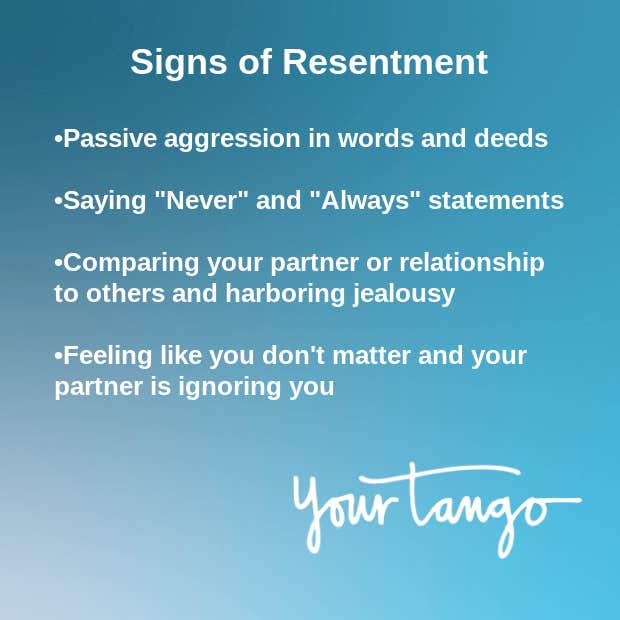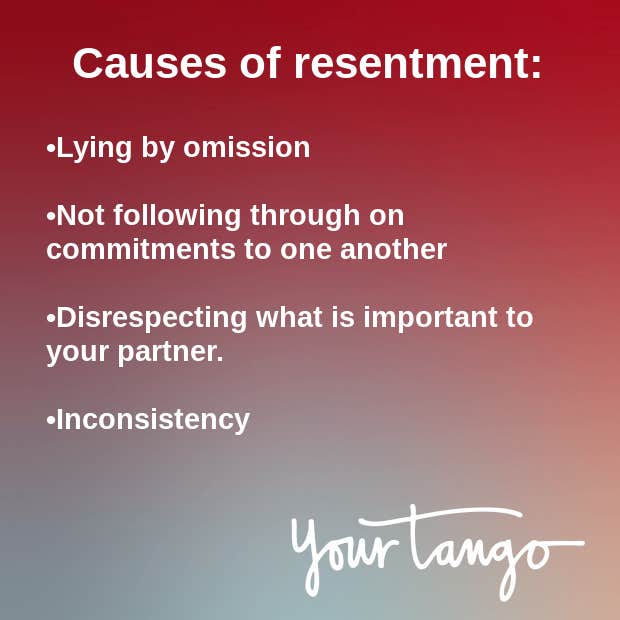4 Common Signs And Causes Of Resentment In Relationships
The death of relationships by a thousand cuts.
 garetsworkshop / Shutterstock
garetsworkshop / Shutterstock Table of Contents
Unless you have been living in some kind of fairy tale, you know that resentment is a destructive factor in marriages and other kinds of romantic relationships.
When you first fall in love, it’s fireworks, roses, and warm fuzzies. You believe you have found the love of your life and the two of you will live happily ever after. And while I'm not saying you can’t or won't live happily ever after, I am saying that doing so is difficult for those couples in even the happiest, healthiest relationships at times.
One of the common reasons relationships fall apart is the creeping normality of resentment.
What is resentment?
In a study titled "Anger And Its Cousins," published in the journal, Emotion Review, the researchers define resentment, "as a hostile emotion qualified by the perception of having suffered a wrong."
They go on to write, "Resentment can be said to be a moral emotion in that it invokes a moral concept such as an acknowledged right or wrong."[fn]Miceli M, Castelfranchi C. Anger and its cousins. Emotion Review. 2017;11(1):13-26. doi:10.1177/1754073917714870[/fn]
And in her PsychCentral article,[fn]Drake K. Dealing with Resentment in Relationships. Psych Central. November 9, 2021. https://psychcentral.com/health/ways-to-stop-resentment-from-ruining-yo…] Kimberly Drake describes resentment as follows: "Resentment is the result of a perception that someone has treated you unfairly. Although the person you resent may not have intentionally meant to harm you, their actions or words may cause you to feel intense disappointment."
Metaphorically speaking, perhaps the best way to illustrate resentment is the trope of a death by a thousand cuts — those everyday instances that inflict pain on the other person slowly, brutally waning what once was and reducing the fireworks between the two of you two to all but an ember or two.
Signs of resentment in relationships
1. Passive aggression in words and deeds.
Passive aggression can be expressed in a variety of ways. For example, your partner may be angry at you for something you may have done (sometimes they may be perfectly insignificant acts you might not remember) that they've bottled up for a week.
They haven't even spoken to you, also known as giving you the "silent treatment."
Finally, when your partner comes home from work one day, you ask how they're doing. They tersely say, "Fine" and leave the room.
(Things are definitely not fine. You can usually pick up on this if it's been a week and they still refuse to interact with you.)
They would rather be avoidant and self-isolate than confront the issue head-on with you so the two of you could have a healthy discussion to work things out.
2. When arguing, they make a habit of saying "Never" and "Always" statements.
Let's say that argument finally happens.
When they do open up — or explode from pent-up agitation — making the leap to try to discuss (or bicker) with the volume up to 11, your partner repeatedly says things like, "You never do nice things for me anymore!" or, "You're always late to everything!" (though constantly being late can be a sign of resentment in and of itself).
Saying these kinds of statements aren't productive, they hurt one's partner and often aggravate the situation, and they usually aren't true.
Whatever the case, these are dangerous words that only increase the negativity and distance between you and your partner. Perhaps you can try to discourage your partner from using them.
3. Feeling jealous of others and comparing one's partner or relationship to others.
Instead of focusing on their own relationship and building and improving upon it, including putting in the work toward self-improvement, your partner constantly compares your relationship to others.
They may think about it constantly, or even talk about it to friends and family. If so, this is taking things another step toward resentment — and Splitsville.
Talking negatively or constantly complaining about one's partner to the people they're close to is yet another sign of resentment, especially if they're complaining about the similarities and differences between your relationship and theirs.
4. You feel like your thoughts and feelings no longer matter, and that your partner isn't interested in you anymore.
You may be developing some anxiety and feelings of loneliness because your partner isn't paying as much attention to you — in the bedroom, in conversation, and in general.
You may even be feeling like they're cutting you out of the relationship, or you don't feel like your voice is being heard in the recent uptick of arguments that's developed. (Also a sign of resentment!)
Maybe they're ignoring your input, feelings or opinions on whatever item at hand up for discussion.
Either way, pay attention to your feelings and what your instincts tell you.
It's not always easy to spot the signs of resentment, but if things feel cold and distant between you and your partner, you should check with your partner to intervene — if what you want is to work things out — in what could be loads of resentment piling up that are creating baggage. And all that baggage can get so heavy that it could wreck your relationship for good.

Neuroscientist Laura Otis offers some examples of potential causes for resentment: "A parent may resent having to perform household duties while his or her partner engages in travel, education, and fulfilling work. An employee may resent disrespectful, humiliating treatment."[fn]The Meaning of Resentment. Psychology Today. https://www.psychologytoday.com/us/blog/rethinking-thought/202107/the-m…]
But there are other subtle things people do that might unknowingly be just as likely to stoke the fires of resentment in their partners.
Causes of resentment
1. Lying by omission.
Lying by omission means lying by omitting something from a conversation.
For example, when asked why you are late coming home, you say that you stopped at the bar for a drink, but you omit that you were there with a friend your partner doesn’t like. You know they would be upset and you don’t want to hurt them or cause any drama.
Have you ever lied to your person because you want to protect them? Have you ever thought that what they might not know might not hurt them? Have you ever purposely not disclosed something because you were scared of the emotional fallout that might follow?
What to do about it: Consider your words before saying them and, more importantly, the intentions behind the ones you say — and don't say.
There are two reasons lying by omission is considered a thing.
The first is that you are keeping something from your partner and that is a lie that will only pave the way for more lies. The other is that if you are ever caught in one of your lies, your partner will lose trust in you and, going forward might be suspicious of everything you tell them.
So, be honest. Always.
2. Not following through on commitments to one another.
Do you and your partner ever agree to do something, and then one or the other of you doesn’t follow through? Do you not follow through because you didn’t really want to do it or because you forgot or because time didn’t allow it? Do you try to sweep it under the rug or make excuses?
Not following through with something without a reasonable explanation is a sign of contempt — that you just don’t do something for whatever personal reason and neglect to talk with your partner about the 'why's and 'how's will sow the seeds of substantial disrespect and resentment.
What to do about it: Make an explicit agreement that when one of you wants to make plans involving the other, you will give your partner precise details, making sure they have all necessary information, and that those plans will then be kept unless something urgent comes up, or you both agree to a change.
My man and I used to have this problem all the time. When we finally talked about it, we learned that, when we make a plan, I assume it’s a done deal, and he assumes we are still going to talk about it. That is just how we both operated before our relationship. We realized we needed to be more explicit about our plan — did we decide to do it, or is more preliminary discussion necessary?
Knowing these things has made following up easier for both of us.
3. Disrespecting what is important to your partner.
I had a boyfriend once who hated how hard I slammed the door of his truck. I didn’t know that I was slamming it. I thought I was closing it like I closed any car old door. But I guess I was closing it too hard and he didn’t like it.
Of course, I thought that he was being ridiculous. It was a big, huge truck and, really, how could little old me cause it any real damage? We bickered about it all the time.
In retrospect, I now understand why closing the truck door with such force was a cruel, thoughtless act. He loved that truck and wanted to take care of it, and he felt like my slamming the door would harm it — and, by extension, it harmed him each loud, forceful time.
I pushed back every time, but it should have been important to me to respect that this was important to him and do everything I could to try to remember to close the door more softly.
What to do about it: Is there something your partner does that they love, but seems absolutely ridiculous to you? If there is, accepting it instead of pushing back could make a huge difference for your relationship.
Consider how many of your own things your partner doesn't get at all, as far as why they're so important to you, but they love all of you, so they're willing to put up with the stuff they don't understand, or even attempt to get involved to show their commitment.
Even if you don't understand the significance of whatever matters so deeply to your partner, you don't need to. Just give it the same respect you owe your partner.
4. Inconsistency.
One of the most difficult things for me about my ex was that he became a different person in different situations.
When he was with me he was wonderful, open, honest and kind.
When he was with his family and his friends, he was a totally different person. He laser-focused on people and then talked about them behind their backs. He said things that were patently untrue to make them like him more. He chose not to speak to me but instead to mingle with everyone. He was always the last one to leave a party, no matter what I wanted because he didn’t want anyone to think he wasn’t cool.
Are you the kind of person who is a chameleon in your life? Do you act differently in social situations and perhaps treat your partner differently?
What to do about it: Doing this can cause way more resentment than you might realize. So, pay attention to how you are in social situations and do your best to keep your behaviors consistent.
Acting this way can not only cause resentment but sow distrust, especially if you criticize the same people you show a friendly face. Consider how this could affect your relationships, including friendships — work toward being more intentional and sincere in your actions and communications with your partner and others.

Trying to prevent resentment in relationships should be the primary goal of each partner.
Those thousand little cuts can negatively impact the health of your relationship even more than overt things like leaving your underwear on the floor.
So, pay attention. Don’t lie, follow through, respect what is important and be consistent.
You will be glad you did. And your partner will appreciate it even more.
Mitzi Bockmann is a NYC-based Certified Life Coach and mental health advocate whose writing has been published on The Huffington Post, Prevention, Psych Central, Pop Sugar, MSN and The Good Man Project, among others.

